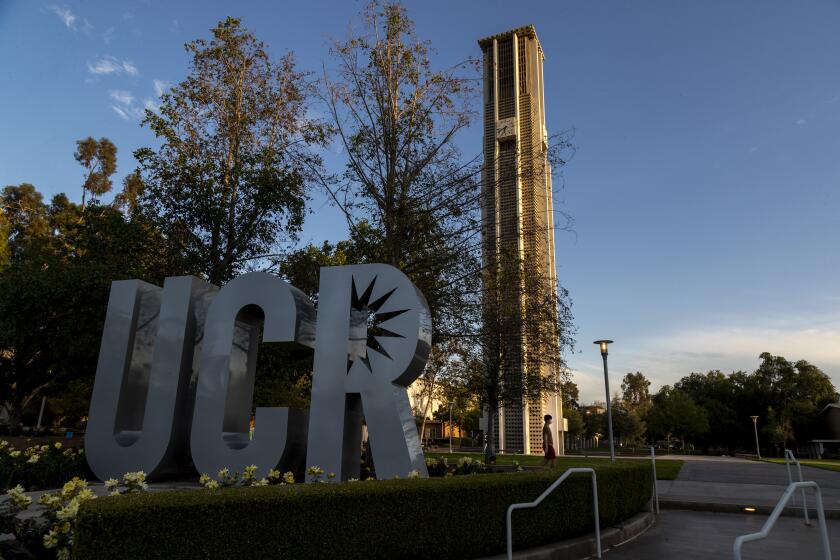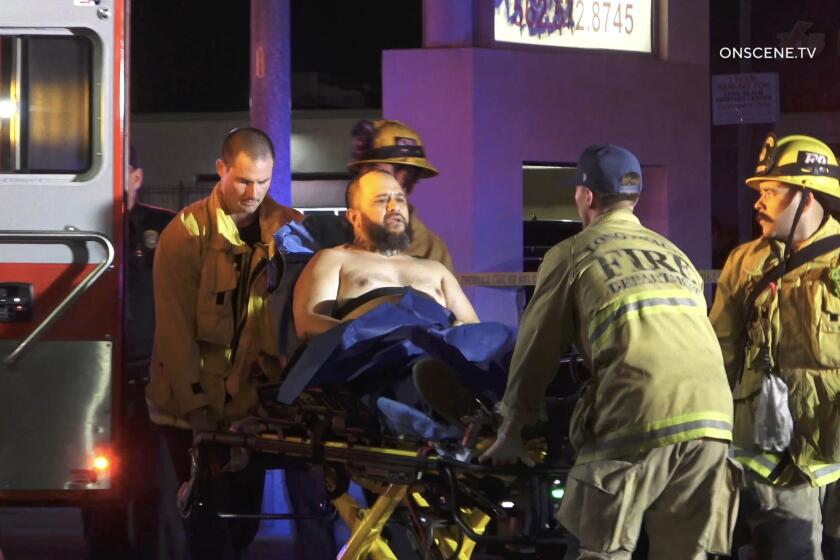Grand Jury Condemns Some Perks as Excessive : Investigations: The final report scolds county supervisors for not keeping tight control over department leaders and for pay raises amid job cutbacks.
Ventura County supervisors should curtail “excessive” perks for top-level officials that are sapping revenues from essential services and forcing layoffs of lower-level employees, the grand jury said Thursday.
In its final report, the 1992-93 Ventura County grand jury scolded the Board of Supervisors for failing to maintain tight control over department heads and for refusing to hold off on pay raises for high-ranking managers while eliminating 200 positions.
“County officials must understand that taxpayers can no longer maintain unreasonable compensation packages,” the report said.
The grand jury cited more than 15 compensation benefits and perks that it said were excessive and should be deleted or amended, including transportation allowances, educational incentive pay and the county picking up employees’ share of Social Security and Medicare taxes.
The 192-page analysis also suggested that total compensation packages “not be obscured in base salary, nor rolled up into the retirement base.”
In response to the report, county Personnel Director Ronald W. Komers defended the county’s salary and compensation packages, saying “they are like any large employer.”
He said the benefits package offered to top county managers remains about half as much as those in private industry. “It needs to be periodically re-evaluated and modified, but there’s nothing out of sync,” Komers said.
The report singled out Komers for criticism for refusing to provide the grand jury and others with “complete details documenting the total salaries and compensation packages for elected and appointed civil servants.”
It urged the next grand jury to “conduct an in-depth investigation” of the personnel office and its policies and made several recommendations to limit Komers’ power. Specifically, the report recommended that the supervisors transfer responsibility for the grievance process, affirmative action and disability laws from the personnel department to the chief administrative officer.
*
Komers denied that he refused to provide the grand jury and others key information about employee salaries. “Once county counsel obtained releases of the information that was considered private, I released everything,” he said.
Until September, the total pay packages of top county officials had been withheld, with county officials maintaining privacy rights for the top administrators.
But after The Times argued that salaries should be open to public scrutiny, officials released the figures showing that the 11 elected officials and Chief Administrative Officer Richard Wittenberg received more than $300,000 in extra benefits in 1991.
Supervisor John K. Flynn said Thursday that he and Supervisor Maria VanderKolk have tried to eliminate a number of the benefits that the grand jury called excessive.
“We presented a 15-point plan a couple of months ago and it was rejected by our colleagues,” Flynn said. “We had a six-hour public hearing where the bureaucracy figuratively beat Maria and I up. It was brutal.”
Other supervisors never took the proposal seriously, Flynn said. “There was never any room to debate and compromise.”
Nonetheless, Flynn said, supervisors are working to undo some of the incentives approved in 1989 to attract and retain top county employees.
In the past three weeks, supervisors have voted to eliminate longevity pay for new workers and delay merit pay increases for 3,700 employees for one year. “We are moving in the philosophical direction of the plan,” Flynn said.
VanderKolk on Thursday said she would support removing many of the perks cited by the grand jury when new labor agreements are negotiated later this year.
“We can’t touch benefits that employees have become vested in,” she said. “It was something they were promised. When the new compensation package comes to the board, we’ll be looking at eliminating a lot of these things.”
However, she defended Komers’ 1989 recommendations to grant the lucrative salary packages.
“A lot of things were approved back when times were good,” she said. “He probably did the same as a lot of personnel directors.”
Supervisor Vicky Howard said she recognizes some of the perks as excessive, but said the grand jury knew the board could not change the benefits packages until they come up for renewal.
“We would subject ourselves to a lawsuit,” Howard said. “I’m dedicated to trying to get the perks and benefits in line with what is given in private industry.”
Although county officials are not required to implement grand jury recommendations, each agency must respond within 30 days.
Other findings and recommendations of the 1992-93 grand jury included:
* The county Civil Service Commission, which responds to employee grievances, should consider contracting with a private attorney instead of using the services of the county counsel. It also recommended discussion between the personnel department and employee groups about replacing the existing commission with both management and union representatives.
* The county affirmative action officer should report to the chief administrative officer instead of the personnel director to avoid potential conflicts of interest.
* Supervisors should “take a hard look” at a worker furlough program instituted in San Bernardino County that saves $9 million annually by closing all nonessential services an extra 10 days a year. With the savings from sending employees home two weeks a year, the report said, “layoffs can be averted.”
* Vehicles assigned to the county’s central motor pool should be better monitored to determine whether transportation costs could be reduced. The 1990-91 jury noted that the General Services Agency was unaware of how many vehicles it operated or were needed.
* A one-stop permitting process should be established to streamline the “very frustrating and cumbersome” system now used in several departments. More applications could be processed by mail and better computer technology would help, the report said.
* The county should retain an independent consultant to investigate alleged discrimination of minorities within the county Resource Management Agency.
* Trustees of the Somis Union School District violated the Ralph M. Brown Act, known as the state’s open meeting law, on at least one occasion. The report recommended that all county and elected officials attend training seminars to ensure their understanding of the law, which requires that the public’s business be conducted in public.
* Supervisors should rank county libraries high on their list of priorities and support legislation that would use confiscated drug assets to help fund library services.
* A countywide gang-tracking system should be implemented, and more recreational opportunities should be explored to deter the growth of gangs.
* Serious moral problems exist within the fire district, and supervisors should continue to support an outside consultant’s efforts now under way.
New Grand Jury Members A new 19-member grand jury was selected Thursday from a pool of 30 eligible applicants immediately following the official release of the 1992-93 jury’s final report.
Nearly 100 people applied to serve on the 1993-94 grand jury, which requires about 40 hours a week and pays $20 a day. Most of those who apply are retired.
The 1993-94 grand jury includes Ruth Austin, Mark Cagnacci and Richard Raymond, all of Ventura, and Arlene Fraser, George Gopaul, Mary Ann Milliken, Marvin Petal and Marybeth Power, all of Oxnard.
Also serving are Edith Everett, Leonard Figura, Michael Fishman and Bob Salyer, all of Thousand Oaks; Patricia Eichenhofer, Mary Lanning and William R. Seaver, all of Camarillo; David Austin of Moorpark; Lloyd Fellows of Ojai; Kevin Kelly of Santa Paula, and Sue Rivers of Oak View.
Fellows will serve as jury foreman.
More to Read
Start your day right
Sign up for Essential California for news, features and recommendations from the L.A. Times and beyond in your inbox six days a week.
You may occasionally receive promotional content from the Los Angeles Times.





